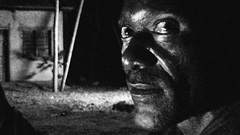Darwin’s Nightmare
 AUSTRIA, BELGIUM, FRANCE / 2004 / English, Russian,
AUSTRIA, BELGIUM, FRANCE / 2004 / English, Russian,
Swahili / Color / 35mm (1:1.85) / 107 min
Director, Script, Photography: Hubert Sauper
Editing: Denise Vindevogel
Sound: Cosmas Antoniadis
Producers: Edouard Mauriat, Antonin Svoboda, Martin Gshlacht, Barbara Albert, Hubert Toint, Hubert Sauper
Production Companies: Mille et une productions, Coop99 Film Produktion, Saga film
World Sales: Celluloid Dreams
In the 1980s, a freshwater fish called the Nile perch was experimentally released into Lake Victoria. The fish’s appetite has since eliminated over 200 native species, but its introduction has given birth to a commercial fishing industry. In the background of this drama however, are the unalleviable miseries of the poor. Meanwhile, Russian-made cargo planes export this fish mainly to Europe and Japan, but what the return flights bring back are not only UN relief goods but weapons likely destined for Africa’s civil wars. The camera has beautifully exposed the ugliness of a reality in which globalization has strengthened the exploitative relationship between the north and the south.
[Director’s Statement] Recently I’ve been thinking about the one word spelled most frequently in documentaries: “problem.” Filmmaking is a search for problems, looking for trouble, so to say.
Among buzz words often found lately is “globalization.” This word is never pronounced in my movie, but whatever it really means, it describes a history of relations. Relations between the six billion or so of us. So the problem is how to relate, how to live, how to survive together on this one planet.
And the old question—which socio-political structure is best for the world—seems to have been answered. Capitalism seems to have won the race. In a Darwinian sense the “good system” naturally survives.
In Darwin’s Nightmare I tried to transform a fish’s bizarre success story and the boom around this ‘fittest’ animal into a scary, ironic allegory for what is called the New World Order. I could easily have made the same movie in Sierra Leone, only the fish would be diamonds; in Honduras, bananas; and in Libya, Nigeria or Angola, crude oil.
We are about to witness and participate in a rather deadly economic world system with little chance of sustainability. Ironically, the individuals in this deadly system don’t have ugly faces, and for the most part, have no bad intentions. These people include you and me. Some of us are “only doing our job.”
Like flying a bomber carrying napalm, some don’t want to know, while others simply fight for survival. I tried to film the personalities in this documentary as intimately as possible. Sergey, Dimond, Raphael, Eliza are real people who wonderfully represent the complexity of this system, and for me, the real enigma. I like to see them as the mirror of our collective problem—the dilemma of a globalized humanity.
 Hubert Sauper
Hubert Sauper
Born in the village of Tyrol in the Austrian Alps, Hubert Sauper has lived in UK, Italy, USA and for the last ten years, France. Having studied film direction in Vienna at the University of Performing Arts and in Paris at the University of Paris VIII, he currently teaches film classes in Europe and USA. The last two documentaries he wrote and directed were awarded twelve international film prizes. As an actor he has appeared in several shorts and two feature length films: In the Circle of the Iris (Dir. Peter Patzak with Phillippe Léotard) and Blue Distance (Dir. Peter Schreiner). Works include On the Road with Emil (1993), So I Sleepwalk in Broad Daylight (1994), Lomographer’s Moscow (1995), Kisangani Diary (1998)—winner of numerous prizes around the world including the Grand Prix at Cinéma du Réel, and Along with Our Stories (2000). Darwin’s Nightmare has won sixteen awards around the world. |
